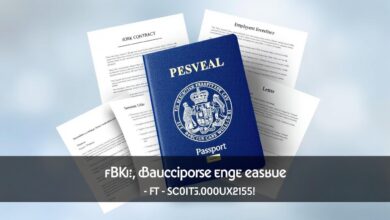Germany Visa Sponsorship: Benefits and Advantages for Technical and Skilled Professionals
Germany Skilled Visa Sponsorship is key to bringing in top talent. With a strong economy, Germany needs skilled workers.
Anúncios
This visa helps attract the best from Nigeria and beyond.
It’s important to know the visa rules for Germany. This knowledge is vital for those aiming to grow their careers in this vibrant country.
Understanding Germany’s Skilled Visa Sponsorship Program
The Germany skilled visa sponsorship program is a way for skilled workers from different fields to find jobs in Europe’s top economy. It meets Germany’s need for specialized skills in many industries. The program makes it easier for qualified people to join the German workforce.
You will remain on the current site
Overview of the Program
The program has key Germany work visa requirements and benefits. It helps grow and diversify the labor market. It also supports the economy by bringing in talent where it’s needed. Knowing the Germany work visa application process helps candidates move to Germany smoothly.
Eligibility Criteria
Applicants need to meet certain Requirements for skilled visa in Germany. This includes having the right education, work experience, and skills. Meeting these requirements can greatly improve a candidate’s chances of getting a visa. It’s important to know the Germany work visa requirements well.
Application Process
Getting through the German work permit process needs careful planning. The Germany work visa application has several steps. You’ll need to collect documents like proof of education and language skills. A well-organized approach can make the application process easier.
Benefits of Germany’s Skilled Visa Sponsorship
Germany is a great place for skilled professionals to grow their careers. It has a strong economy and needs foreign talent. With a skilled worker visa, you can find many jobs that help you advance and contribute to different fields.
Career Opportunities in Germany
Germany has many job opportunities for foreigners, covering a wide range of skills and backgrounds. Its strong industries, like tech, engineering, healthcare, and finance, welcome experts. This creates a supportive work environment that values innovation and skill.
Employers in Germany actively seek out top talent through Visa sponsorship. This helps their businesses grow and succeed.
Competitive Salaries and Benefits
Working in Germany comes with competitive salaries. Skilled workers often earn more than in other European countries. Here’s a look at salary ranges in some key sectors:
| Sector | Average Salary (EUR) |
|---|---|
| Information Technology | 50,000 – 80,000 |
| Engineering | 45,000 – 75,000 |
| Healthcare | 40,000 – 70,000 |
Workers also get great benefits like health insurance, paid vacation, and retirement plans. These perks make life better for skilled workers and their families.
Pathway to Permanent Residency
Getting a skilled worker visa in Germany can lead to permanent residency. After meeting certain requirements, migrants can stay long-term. This means access to more services, education, and the chance to be with family.
Key Industries Seeking Skilled Workers in Germany
Germany is a great place for foreigners looking for jobs, especially in areas where skilled workers are needed. The country’s strong economy, good infrastructure, and focus on new ideas make it appealing. If you’re thinking about getting a skilled worker visa in Germany, you’ll find many industries looking for your skills.
Information Technology
The need for IT experts in Germany is growing fast. This includes jobs like software developers, data scientists, and cybersecurity specialists. Cities like Berlin and Munich are hubs for tech, with lots of start-ups and big companies. To get a skilled worker visa, you need to meet certain requirements, like the right education and experience.
Engineering and Manufacturing
Germany is famous for its engineering and manufacturing, especially in cars and mechanical parts. There’s a big need for engineers because of a talent shortage. The country’s advanced manufacturing and focus on quality mean lots of job opportunities for foreigners. You’ll likely need a skilled worker visa to work in these fields.
Healthcare Professionals
Healthcare is a big need in Germany, with a shortage of skilled workers. This includes nurses and medical specialists. To get a work visa, you need the right qualifications and to speak German well. Working in healthcare can be a rewarding and stable career.
Required Qualifications for Applicants
Applicants for the skilled worker visa in Germany need to meet specific qualifications. These include educational credentials, relevant work experience, and language skills. Knowing these requirements helps candidates prepare for the application process.
Educational Credentials
Candidates must have recognized educational qualifications to meet the requirements. Acceptable credentials include:
- Bachelor’s or Master’s degrees from accredited institutions
- Vocational training certifications relevant to the field
- Professional development courses or industry-recognized certifications
These educational achievements are key for non-EU citizens wanting to work in Germany. They show a candidate’s readiness for specialized industries.
Work Experience
Work experience is vital for the application. Candidates should have at least two to three years of experience in their field. This experience shows they are competent for the job.
Employers in Germany look for this experience. It helps them decide if a candidate is right for the skilled worker visa.
Language Proficiency
Language skills are important for both the application and working in Germany. Knowing German is crucial for communication at work and daily life. Candidates should aim for at least B1 level proficiency.
Tests like TestDaF or Goethe-Institut exams are recognized. Meeting the language requirement is essential. It makes candidates stand out in a competitive job market.
The Application Process for Nigerian Professionals
Nigerian professionals wanting to work in Germany face a detailed application process. This process requires gathering important documents and knowing the steps for the Germany work visa application. It’s key to understand the requirements for a skilled visa in Germany for success. Here’s a step-by-step guide to make this journey easier.
Step-by-Step Guide to Applying
To apply for a Germany work visa, follow these steps:
- Learn about Germany work visa requirements, including who can apply and what documents are needed.
- Collect all necessary documents like proof of qualifications, work history, and language skills.
- Fill out the Germany work visa application form correctly and send it to the right German authority.
- Get ready for interviews with employers or visa officers.
- Keep track of your application’s status to avoid delays.
Common Application Pitfalls
Many applicants hit roadblocks that can slow down or stop their visa application. Common issues include:
- Submitting incomplete applications, which can get rejected right away.
- Not understanding requirements for skilled visa in Germany and making mistakes in documents.
- Not showing enough proof of qualifications or work experience.
Tips for a Successful Application
To boost your chances of getting a visa, consider these tips:
- Show your qualifications clearly, focusing on skills and experience for the job.
- Start talking to potential employers early to get visa sponsorship in Germany.
- Get ready for interviews by practicing answers and learning about the German work scene.
- Stay in touch with your sponsor to keep everyone on the same page.
Financial Considerations for Moving to Germany
Thinking about moving to Germany for work? It’s important to be financially ready. Knowing the cost of living, what you can earn, and financial help available is key. This helps you make smart choices before you go.
Cost of Living Overview
The cost of living in Germany changes a lot depending on where you are. Things like housing, food, and transport costs vary. For example, Munich and Frankfurt are pricier than Berlin and Hamburg. Here’s a look at what you might spend in these cities:
| City | Average Monthly Rent (1 Bed Apartment) | Groceries (Monthly) | Public Transport (Monthly Pass) |
|---|---|---|---|
| Munich | €1,200 | €250 | €60 |
| Berlin | €1,000 | €230 | €84 |
| Frankfurt | €1,100 | €240 | €80 |
| Hamburg | €1,050 | €220 | €90 |
Salary Expectations
Germany is known for its good salaries. What you earn depends on your job and field. Tech and engineering jobs usually pay more. Knowing this helps with planning your finances, especially when comparing to Nigeria. Here’s a quick look at what you might earn in different fields:
- Information Technology: €50,000 – €70,000 annually
- Engineering: €45,000 – €65,000 annually
- Healthcare: €40,000 – €60,000 annually
Financial Support Options
There are many ways to get financial help when moving to Germany. You might get:
- Bank loans for housing or personal needs
- Help from your employer for moving costs
- Public benefits for those adjusting to the new life
Cultural Adaptation and Integration in Germany
Adjusting to life in Germany means getting to know the local culture. This culture values hard work, being on time, and good manners. Understanding these customs helps those looking for jobs in Germany.
Learning about everyday traditions makes life easier for those on a skilled worker visa. It improves their experience in Germany.
Understanding German Culture
German culture is all about being organized, on time, and professional. Knowing these values helps in work and social life. It makes building relationships and communication easier.
This is key for meeting work visa requirements in Germany.
Community Support Networks
Community support is crucial for immigrants. Expatriate groups and local organizations help a lot. They offer advice on adapting to German life and finding jobs.
Being part of these communities helps you feel at home. It also gives you valuable support.
Language Classes and Resources
Speaking German is important for fitting in. It opens up job opportunities and helps you connect with locals. There are many language classes and online resources to help.
Places like the Goethe-Institut and online programs suit different learning needs. Learning German boosts your chances of getting a work visa.
Legal Rights and Protections for Visa Holders
It’s important for skilled visa holders in Germany to know their legal rights and protections. These include employment rights, health insurance, and keeping legal residency status. These aspects are crucial for expatriates to succeed in Germany’s work culture.
Employment Rights
Visa holders in Germany have strong employment rights. They get fair treatment at work, just like Germans. Employers must pay equally for equal work and follow the law. This ensures skilled workers can do well in their careers.
Health Insurance Requirements
Everyone in Germany, including visa holders, must have health insurance. When applying for a visa, showing health insurance is required. It’s important to pick a plan that fits your needs and visa requirements. Germany offers public and private health insurance options.
Legal Residency Status
Getting legal residency status is a big deal for visa holders. It’s granted during the visa application and kept by following Germany’s rules. Legal residency benefits not just the individual but also their family. It also helps with future citizenship applications.
Networking Opportunities for Skilled Professionals
Professional networking is key for those looking to grow their careers in Germany. There are many resources to help skilled workers make new connections and find job opportunities. By joining professional groups, attending job fairs, and using online platforms, you can boost your career.
Professional Associations
Being part of professional associations is very helpful. These groups offer mentorship, training, and access to jobs. They help connect you with experts and others in your field. Being a member can make you more visible and credible in the job market.
Job Fairs and Recruitment Events
Going to job fairs and recruitment events is a great way to network. These events happen in big cities and offer chances to meet employers and peers. They are a place to learn about Visa sponsorship in Germany and find jobs that fit your skills. You can make important connections and get insights into the job world.
Online Networking Platforms
Online networking has changed the game. Sites like LinkedIn and job boards help connect workers with employers. They let you show off your skills and experience. Spending time on these platforms can help you grow your network and advance your career.
| Networking Opportunity | Description | Benefits |
|---|---|---|
| Professional Associations | Organizations related to specific industries | Access to resources, mentorship, job openings |
| Job Fairs | Events for direct employer engagement | Personal connections, exposure to job offerings |
| Online Platforms | Digital tools for networking and job searches | Broadened connections, professional visibility |
Success Stories of Nigerian Professionals in Germany
Many Nigerian professionals have found new opportunities in Germany, thanks to the skilled visa sponsorship. Their stories show how the work visa application has changed their lives. For example, a software engineer from Lagos moved to Berlin and now leads a top tech firm.
These stories highlight the need for hard work and flexibility. Those who got the visa in Germany stress the importance of being well-prepared. They say learning the language and understanding the local work culture are key. They also advise newcomers to look for networking chances and community support.
Skilled migration does more than help individuals. It also boosts the German economy and workforce. The visa sponsorship creates a win-win situation, sharing knowledge and skills. This benefits both the migrants and the local job market. As more Nigerian professionals succeed in Germany, their stories motivate others to explore new opportunities.
FAQ
What is the Germany Skilled Visa Sponsorship program?
The Germany Skilled Visa Sponsorship program helps attract skilled workers from abroad. German employers can sponsor visas for these professionals. It aims to fill job gaps and support immigration.
What are the requirements for a Germany work visa?
To get a Germany work visa, you need a recognized degree, relevant experience, and good German language skills. The exact needs can change based on your job and where you’re from.
What job opportunities are available for foreigners in Germany?
Germany has many job openings for foreigners, especially in IT, Engineering, and Healthcare. There are many roles across different industries, making it a great place for career growth.
How does the German work permit process work?
Getting a German work permit involves several steps. You need to find a job, apply for a visa, and gather documents like contracts and qualifications. Following the official guidelines is key for a smooth application.
What does the skilled worker visa in Germany entail?
The skilled worker visa lets foreign professionals live and work in Germany for specific jobs. It’s valid for a certain time and can lead to permanent residency if you meet immigration rules.
How can one secure visa sponsorship in Germany?
To get visa sponsorship in Germany, you need a job with a German employer who will sponsor your visa. The employer must show they can’t find a local candidate and that you’re qualified for the job.
What are the common pitfalls during the Germany work visa application?
Mistakes include incomplete applications, lacking proof of qualifications, and not understanding the needed documents. It’s vital to carefully read the application guidelines and prepare all documents correctly.
What language proficiency is required for a skilled visa in Germany?
For a skilled visa, you need to show you can speak German well, at least at the B1 level. You can use tests like TestDaF or other recognized exams to prove this.
How does the cost of living in Germany compare to other countries?
Living costs in Germany vary by city, with big cities like Munich and Berlin being pricier. But, German salaries are competitive, helping balance out the costs. It’s important to understand these financial aspects when moving.
What options are available for financial support for newcomers in Germany?
Newcomers can look into financial help from employers, bank loans, and public benefits. These resources can make the move easier and cover initial costs.
What rights do skilled visa holders have in Germany?
Skilled visa holders in Germany have rights like fair pay, good working conditions, and health insurance. Knowing these rights is crucial for a smooth experience in Germany’s job market.
Published on: 11 de April de 2025

Arturo González
Arturo González is the founder and lead writer of DebxCred.com, a platform created to help people make smarter and more informed financial decisions. With a degree in Business Administration and a specialization in Financial Marketing, Arturo built a solid corporate background before deciding to share his knowledge in a practical, easy-to-understand way.
Driven by a genuine passion for finance and education, Arturo turned DebxCred.com into a trusted source for detailed reviews of financial products, digital banking tools, and practical financial education — empowering readers to take control of their money with confidence.
In his free time, Arturo finds balance and inspiration while surfing — a hobby that reflects his calm yet determined approach to helping others build a healthier and more prosperous financial life.






